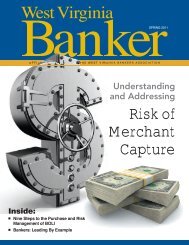official publication of the washington bankers association - Media ...
official publication of the washington bankers association - Media ...
official publication of the washington bankers association - Media ...
Create successful ePaper yourself
Turn your PDF publications into a flip-book with our unique Google optimized e-Paper software.
Serving The Needs Of Washington Bankers Since 1889<br />
Federal Reserve Board Proposes<br />
New Remittance Transfer<br />
Regulations Under Dodd-Frank Act<br />
By Andrew J. Lorentz and Brian Hurh, Davis Wright Tremaine, LLP<br />
Scope <strong>of</strong> proposed rules<br />
“Remittance transfers” under <strong>the</strong> proposed<br />
rules involve a request by a “sender” to<br />
make an electronic transfer <strong>of</strong> funds to<br />
a “designated recipient” that receives <strong>the</strong><br />
funds in a foreign country through a “remittance<br />
transfer provider.”<br />
Business-to-business or business-toconsumer<br />
transactions, and transfers <strong>of</strong><br />
$15 or less, are exempted.<br />
On May 23, 2011, <strong>the</strong> Board <strong>of</strong> Governors <strong>of</strong> <strong>the</strong> Federal Reserve<br />
(<strong>the</strong> Board) published proposed rules to regulate foreign<br />
remittances. The rules implement provisions <strong>of</strong> <strong>the</strong> Dodd-<br />
Frank Wall Street Reform and Consumer Protection Act (<strong>the</strong><br />
Dodd-Frank Act) requiring disclosures and o<strong>the</strong>r consumer<br />
protections for remittances as a matter <strong>of</strong> federal law for <strong>the</strong><br />
first time. The new requirements may improve transparency for<br />
senders <strong>of</strong> remittances, but <strong>the</strong>ir complexity and prescriptive<br />
nature seem likely to increase costs for providers.<br />
Cash remittances from <strong>the</strong> United<br />
States to foreign households have<br />
traditionally been regulated at<br />
<strong>the</strong> state level under state money<br />
transmitter statutes and Article 4A <strong>of</strong> <strong>the</strong> Uniform<br />
Commercial Code. The Dodd-Frank Act<br />
changed this balance by amending <strong>the</strong> Electronic<br />
Fund Transfer Act (EFTA) to broadly<br />
define remittance transfers to include transactions<br />
that traditionally have not been governed<br />
by EFTA, such as consumer wire transfers. New<br />
rules under Regulation E would require both<br />
financial and non-financial remittance providers<br />
to deliver rate and fee disclosures (in both<br />
English and <strong>the</strong> sender’s foreign language),<br />
investigate and correct errors, and provide<br />
cancellation rights and refunds at no additional<br />
cost to <strong>the</strong> sender.<br />
www.wa<strong>bankers</strong>.com 28<br />
“Remittance transfer providers” would<br />
include both financial and non-financial<br />
institutions, but payment networks are not<br />
considered remittance transfer providers<br />
to <strong>the</strong> extent <strong>the</strong>y only provide third-party<br />
payment and settlement services. If, however,<br />
<strong>the</strong> sender uses a debit or credit card<br />
issued by a payment network to transfer<br />
funds to a designated recipient, such<br />
transfer would be a “remittance transfer”<br />
and <strong>the</strong> payment network would be considered<br />
a “remittance transfer provider”<br />
in this case.<br />
Transactions that traditionally have not<br />
been subject to EFTA, such as cash-based<br />
remittances sent through money transmitters<br />
and consumer wire transfers made<br />
through banks, would fall within <strong>the</strong> scope<br />
<strong>of</strong> <strong>the</strong> proposed rules. The proposed rules<br />
would also apply to certain transfers not<br />
traditionally considered to be remittances,<br />
such as online bill payments to a designated<br />
foreign recipient.<br />
Disclosure requirements<br />
The proposed rules would require remittance<br />
transfer providers to give senders

















